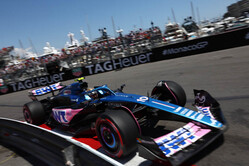


08/08/2023
NEWS STORY
 Mercedes boss, Toto Wolff has warned the sport against balancing the performance of engines in a bid to appease Alpine.
Mercedes boss, Toto Wolff has warned the sport against balancing the performance of engines in a bid to appease Alpine.
At the recent meeting of the F1 Commission it was confirmed that in terms of engine equalisation, over the first half of the season there was one manufacturer clearly down on its rivals.
This followed (then) Alpine team boss Otmar Szafnauer's claim that the French manufacturer's unit was "significantly down", indeed by as much as 20 - 33 bhp, on its rivals.
Though the current rules are in place until 2025, Alpine called for equalization of performance, a move which got the support of Red Bull's Christian Horner.
"It is about seeing what are the deficits," he said, according to Motorsport.com. "The FIA have all of the data and they should present exactly what the differences are.
"I think that would be fascinating for everybody to see," he added, "and I think that if there is a deficit under homologation, then it's something that we should be sensible about, otherwise, you're locked in for two years. I wouldn't be averse to a sensible discussion."
Days later the F1 Commission agreed to give a mandate to the Power Unit Advisory Committee to consider the call and report its proposals.
In reaction to the F1 Commission's decision, interim Alpine boss, Bruno Famin reinforced the need for the move. "The engine is a bit behind for sure," he said. "It's a fact that the engine is in a frozen period, and we cannot develop performance."
However, Toto Wolff believes that such a move would be a disaster for the sport, claiming that it would amount to a 'success penalty' for the other manufacturers and could prove catastrophic for F1.
"Entertainment follows sport, and why the sport is so credible is because you have just got to work hard to be successful," Wolff tells Motorsport.com.
"If you're falling back as an engine supplier, and your engine isn't as performant as others, that's obviously everybody's problem," he adds. "But at the same time, with a frozen engine, we don't want to lose out on giving someone opportunities.
"But it needs to be done in a meritocratic way," he warns. "And, for that, we have a rule in the 2026 power unit regulations that if one power unit will drop out of 3% below the top power unit, then the teams would sit down in good faith and debate what could be done.
"And once we have a common understanding of what the lack of performance is, we need to discuss how much more dyno hours and development jokers can be given. And that is something that we are to debate.
"But touching any kind of fuel flow, or BOP (balance of performance), is a catastrophe and bankruptcy declaration for F1," he insists. "It should never even be talked about."
At Ferrari, Frederic Vasseur agrees, sort of.
"It's true that when we decided to freeze the engine we considered that in exceptional circumstances we could try to find a way to support the guy who would be completely out of the range," said the Frenchman. "But I'm not sure that Renault is so far away. We don't have the same numbers as Renault."
Should the move get the green light however, Vasseur is adamant that tweaking fuel flow should not be seen as a solution, Ferrari, of course, having history in this particular area.
"If we have to do something, it can't be fuel flow," he said. "We have the same approach with the wind tunnel allocation. The guy who is P10 in the championship has more time in the wind tunnel. It's not that he has 10 kilos less weight.
"You allow the team or the PU manufacturer to develop, and you don't give him an advantage. That I think would be the start of the balance of performance."